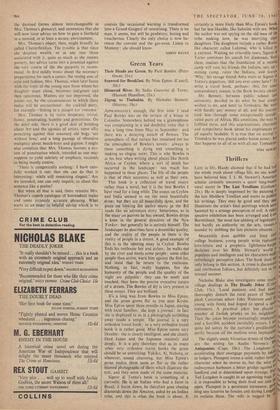Green Years
Zigzag to Timbuktu. By Nicholas Bennett. (Murray, 18s.) APPROPRIATELY enough, the first time I read Paul Bowles was on the terrace of a house in Colombo. Somewhere behind me a gramophone was complaining in a sad doubtful voice that it was a long time from May to September: and there was a decaying stench of flowers. The atmosphere of that terrace has remained for me the atmosphere of Bowles's novels: always in them something is dying and something is making an elegiac noise. This is why Bowles is at his best when writing about places like North Africa or Ceylon, where a sort of death has occurred in the landscape: too much has happened in these places. The life of the people is that of their ancestors as well as their own.
This book is a collection of travel essays rather than a novel, but it is the best Bowles I have read for a long while. The 'essays on Ceylon and India seemed to me the most beautifully done: but they are all beautifully dpne, and the piece on looking for native music in the Rif reads like an adventure story. Sometimes, as in the essay on parrots he has owned, Bowles drops a knee in the general direction' of the New Yorker: but generally he is entirely himself. The landscapes.he describes have a dreamlike quality, and the reality of the people in them is the reality of people in a dream. A good example of this is in the opening essay in Ceylon. Bowles flrids his resthouse hot and airless: he walks out by the river and meets some people: some other people then arrive, warn him against the first lot, and insist that he return to the resthouse. Nothing, in fact, really happens, but the humanity of the people and the quality of the night are palpable: they can be smelt and touched, they have the precise evocative nature of a dream. The Bowles of kif is very present in these essays. They are brilliant.
It's a long way. from Bowles to Miss Epton, and the prose grows flat as you near Kyoto. Miss Epton spent three months in Japan, staying with local families: she kept a journal: in fact she is displayed to us in a photograph scribbling away inside a temple. The journal is a very orthodox travel book: as a very orthodox travel book it is rather good. Miss Epton seems very likeable: she is clearly intelligent, and she clearly liked Japan and the Japanese sincerely and deeply. It is a pity therefore that as in many other very orthodox travel books the prose should be so unexciting. Yukiko, Al, Noboru, or wherever, sound charming, but Miss Epton's prose makes them seem as flat as the rather blurred photographs of them which illustrate the text, and they seem made of the same material.
Signor di Turno's book is something of a curiosity. He is an Italian who had a farm in Brazil, it burnt down, he therefore goes chasing diamonds down the Amazon, aided by an Indian tribe, and, this is what, the boa is about. It certainly is more lively than Miss Epton's book, but far less likeable, like Sabatini with sex. When the author was not spying on the old men of the tribe making love, he was marrying their daughters. The daughters include a rather Rima. like character called Lolomai, who is killed by a cayman. Wasting no crocodile tears, Signor di Turno continues his search for diamonds, finds them, realises that the foundation of a mining camp will ruin his friends the Indians, sets up a mining camp, ruins the Indians, and leaves; `Why,' his savage friend Antu wails at Signor di Turno's departure, 'did you ever come here?' write a travel book, perhaps: this, for some extraordinary reason, is the Book Society choice, Mr. Bennett, between public school and university, decided to do what he had always wished, to do, and went to Timbuktu. He went with hardly any money at all, and his journey took him through some exceptionally unculo' vated parts of Africa. His ambitions, the way be fulfilled them, and this unpretentious, charming and sympathetic book about his experiences are all equally laudable. It is.true that on arrival In Timbuktu he was placed under house arrest: but that happens to all of us with all our Timbuktu''
DOM MORASS






























 Previous page
Previous page